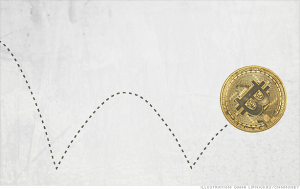 Bitcoin is an online digital currency, also known as a crypto currency. Anyone with a computer and a credit card can acquire them, simply by exchanging a regular currency for Bitcoins online. However, unlike conventional forms of money transferred via a bank, transactions with Bitcoin are transferred directly from person-to-person. The transactions are still verified, recorded in a public ledger known as a block chain. This is a database processed (or ‘mined’) by members of the Bitcoin community who use their computers to process a blockchain that records all the transactions that have taken place with the currency. With this information, it is possible to find out how much value of the currency belonged to each Bitcoin holder at any point in the history of the currency.
Bitcoin is an online digital currency, also known as a crypto currency. Anyone with a computer and a credit card can acquire them, simply by exchanging a regular currency for Bitcoins online. However, unlike conventional forms of money transferred via a bank, transactions with Bitcoin are transferred directly from person-to-person. The transactions are still verified, recorded in a public ledger known as a block chain. This is a database processed (or ‘mined’) by members of the Bitcoin community who use their computers to process a blockchain that records all the transactions that have taken place with the currency. With this information, it is possible to find out how much value of the currency belonged to each Bitcoin holder at any point in the history of the currency.
Unlike currencies run by a government’s central bank, there is a limited number of Bitcoins – 21 million to be precise. If the value of one bitcoin is too high for a particular transaction, individual Bitcoins can be divided into smaller parts, making it possible to buy or sell something for a half or a tenth of a Bitcoin. The 21 million limit prevents actions such as quantitative easing taking place – where money is printed and put into a financial system. Although a useful tool for reducing national debt, quantitative easing also devalues a currency, which is bad news for potential investors.
However, Bitcoin is by no means a stable currency. Bitcoin’s value shot up in late 2013. However, since then, the value of the currency has fluctuated dramatically. At present, digital currencies such as Bitcoin therefore represent an exciting, albeit highly risky, opportunity for investors.
Security issues have also threatened the viability of Bitcoin. The code that processes a Bitcoin transaction has previously been altered, to make it appear as if already processed transactions were unprocessed. This resulted in a second payment being made in a new form of online fraud. This had severe implications for Mt. Gox, a Bitcoin exchange based in Tokyo. In 2014, as a result of the fraud, Mt. Gox was unable to pay out legitimate withdrawals. Mt. Gox subsequently suspended trading, closed its website and exchange service, and filed for bankruptcy. Whilst Bitcoin’s independence from government central banks is often seen as a good thing, it also means that institutions are unlikely to enjoy the security blanket of a government bailout in emergency situations. As Mt. Gox customers have learned the hard way, in the eyes of governments, Bitcoin financial institutions are by no means too big to fail.
This does not mean that governments are unconcerned about Bitcoin. Digital currencies such as Bitcoin present two sets of challenges for government officials. First, digital currencies often have an emphasis on libertarian free-market values. As they are not processed by any bank, and entirely managed by a peer-to-peer network outside the control of state institutions, there remain challenges on how governments can regulate and tax this new form of currency. Second, Bitcoin’s distance from state institutions makes it an attractive form of payment for criminal activity. The currency is regularly used on illegal online markets that sell illicit drugs, weapons, stolen data and hacking tools. Law enforcement agencies also face fresh challenges in detecting the money laundering of digital currencies.
It should be acknowledged that Bitcoin is one of a number of emerging online currencies. This raises questions about how online currencies will compete with one another and distinguish themselves from the crowd. Certain digital currencies may seek to separate themselves by being more secure, reliable or convenient than their competitors. With digital currencies having previously proved volatile and at times insecure, perhaps the challenge for all digital currencies is to establish themselves in what is a highly uncertain market.
 Author Jamie Collier: http://www.cybersecurityrelations.com
Author Jamie Collier: http://www.cybersecurityrelations.com
Source: Cyber Security Intelligence























Trackbacks/Pingbacks